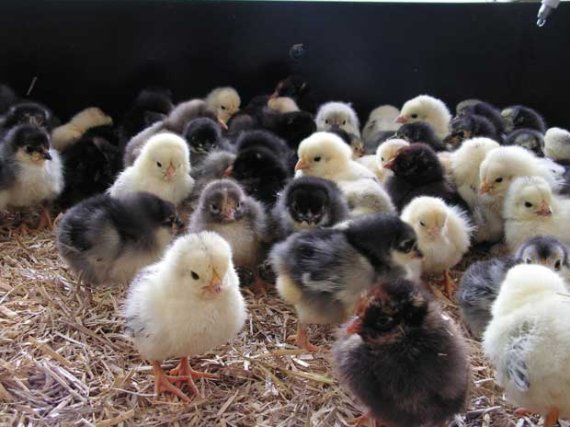Genetic engineering in the interests of animal welfare, which has been rejected by a majority in the lower house of the Dutch parliament. Do you agree?
Robin van den Berk
student of Animal Sciences ‘I am in favour of the genetically modified chicken. The main question as far as I’m concerned is: is it safe? In this case, the genetically modified cockerels don’t enter the food chain, so they don’t pose any threat to food safety. And you prevent the culling of one-day chicks. Besides which there is also an economic argument: by shredding all the male chicks you waste half of your production capacity. Personally, I draw the line at GM products entering into our food supply.’
Cor van der Weele
special professor of Humanist Philosophy ‘Unfortunately the debate is dominated by economic considerations. This has led to the rejection of the ‘dual purpose chicken’ as an option, for instance, because it’s too expensive. I don’t think GM is inherently problematic but we need to take a step back in the debate: if animal welfare can only be addressed by a narrow range of options dominated by issues of competitiveness and efficiency, then there is something wrong with the balance of power within that debate. The problem here, it seems to me, is that the prevailing discourse leaves too little room for more profound questions about human-animal relations. However tricky they may be, I don’t think we can duck the big questions about the treatment of animals in the livestock sector.
Anne van Lith
director of Zonnerfarm Ei, and poultry farm and egg processing station Sterksel ‘As a poultry farmer I am keen to work to improve animal welfare. The killing and shredding of one-day cockerels is absolutely undesirable. The GM chicken seems like a good alternative, but the problem is the public fear of genetic modification. We notice it all the time. Supermarkets demand that our eggs don’t come from chickens that get genetically modified feed. The fear of GM products is deep-rooted, and politicians are sensitive to consumer fear. Too bad, because in this case the product that ends up in the shop hasn’t even been modified.’
Matthijs Kolpa
chairman of the Wageningen Environmental Platform, co-organizer of GMO debate ‘I don’t feel strongly about the GM chicken one way or the other. Many people say ‘leave nature alone’, rejecting genetic modification of higher organisms. I can sympathize with that, to a degree. However, some types of chicken have already been subject to so many breeding programmes you can barely call them natural anyway. On the other hand, animal suffering is very widespread in the sector. Have you ever seen a film of roosters tumbling from the conveyor belt into the mincer? Not very nice, let me tell you. As far as that’s concerned I say: go ahead with genetic engineering, so long as I don’t start giving off fluorescent light.’
Esther Kok
business unit Authenticity & Novel Foods, Rikilt We know that genetic modification of animals is a sensitive subject in the public eye, so I would explore other options first. And then my preference would be for the dual purpose chicken. In that scenario, cockerels don’t get gassed or minced but are raised for their meat. Perhaps it would lead to an increase in the cost of eggs and chicken, but that’s just the price we have to pay. To my mind, the GM chicken is a rather technology-reliant solution. I don’t think you should use exogenous genetic markers to differentiate GM from acceptable food. On the other hand, I understand that in this case the jellyfish gene is only carried by the male embryo, meaning it doesn’t end up in the food chain. That’s technically a good solution, but I can’t help wondering: what do you do with the millions of eggs that do have the jellyfish gene? Throw them away? Use them for cattle feed? Either way, you end up wasting food.’
Bart Gremmen
professor of Ethics in Life Sciences and project leader for ‘Alternatives to the killing of newly hatched chicks’ ‘The interesting thing about the GM chicken is that the modification isn’t to the end product but the process. The modified eggs, the cockerels, are filtered out before they even enter the incubator. That’s an important difference with traditional GM techniques but it isn’t always reflected in the debates. The dual purpose chicken seems like a good solution, but it isn’t really. Both its meat and eggs are of a much lower quality than the consumer is used to. Besides, it is not economically viable. So continuing with the current status quo seems the only option. Day-old cockerels get killed but they don’t get thrown away, they still serve a purpose. For many people that makes it acceptable. It’s an interesting case for us as researchers. It’s not about a choice between good and evil but between bad and less bad.’

